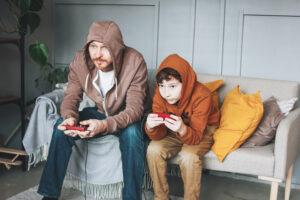 Q. My son is 15 years old, so that means I shouldn’t tell him what to do, right? We have a pool, and I’d rather he swim than play video games. He prefers the latter. He seems to be all done with pool games as are his friends. When they come over, they sit with their feet in the pool and wait for their required outdoor time to end so they can go inside and play video games. Although I’ve adopted a pretty good ability to not be controlling, I’m finding it harder to apply this to my 15 year old than my older son. He wasn’t as much of a video game kid. Neither of them have been outdoor kids and I guess I have to finally get over it. Any thoughts or comments?
Q. My son is 15 years old, so that means I shouldn’t tell him what to do, right? We have a pool, and I’d rather he swim than play video games. He prefers the latter. He seems to be all done with pool games as are his friends. When they come over, they sit with their feet in the pool and wait for their required outdoor time to end so they can go inside and play video games. Although I’ve adopted a pretty good ability to not be controlling, I’m finding it harder to apply this to my 15 year old than my older son. He wasn’t as much of a video game kid. Neither of them have been outdoor kids and I guess I have to finally get over it. Any thoughts or comments?
A. Letting go of control, what our children do and how they do it, is the greatest challenge for any parent. We have learned from lots of mistakes and want our children to benefit. But did we benefit from what our parents tried to tell us? We all have to learn in our own way at the time that is right for us.
How much to control or not over gaming and internet use seems to be the biggest challenge any parent has ever had to face. We’re up against more than our children’s desire, but the whole industry that has figured out just how to pull kids in and keep them hooked. It is a phenomenon that has never been rivaled. Television seems tame in comparison.
Assessing your son’s quality of life is what is important. If he does other things as well as spending time on his devices, i.e. sports, school work, hanging out with friends (even if they’re just sitting by the pool), jobs, helping around the house, eating together, then I would not worry about his gaming. As a matter of fact, if these other things are in place, I would encourage you to allow your 15 yo to determine his own time.
When kids are controlled, especially around screen time, they tend to hoard what is being controlled. Until something changes, video gaming, YouTube viewing, and social media is the entertainment of choice of most kids today. Instead of fighting what they love the most (which never results in connection and cooperation), leave that alone and put your energy toward encouraging other things. This means investing time on your part which you might not have. Invite your son to do things with you—watch movies together, go to sports events and concerts together (finally this may start up again), take little trips together. Also take an interest in what interests him—even his games. Ask if you can play a game with him. Have him teach you and be the expert. Laugh and get silly when you cannot manage the controls. Ask him what it is about each game he likes that draws his attention. What is the goal? All with only curiosity and no judgment. My son loved telling me about the quests and the new technology of each game (even though murder and mayhem was all I could see!)
 A big problem is that parents today hate video games and have all kinds of fears about them. The evils of gaming are not as great as we make out. But when our kids think we hate them, we might as well be saying, I hate and disapprove of what you love and what gives you so much pleasure. Find a way to see the games from his point of view. When he knows you are okay with what he likes, then you can discuss how the games are designed to be addictive and what he thinks about that. But not if he thinks you are going to try to stop him from playing.
A big problem is that parents today hate video games and have all kinds of fears about them. The evils of gaming are not as great as we make out. But when our kids think we hate them, we might as well be saying, I hate and disapprove of what you love and what gives you so much pleasure. Find a way to see the games from his point of view. When he knows you are okay with what he likes, then you can discuss how the games are designed to be addictive and what he thinks about that. But not if he thinks you are going to try to stop him from playing.
Addiction is very real but not as common as we may think. If your son is addicted, he has checked out of everything, does not communicate with parents or friends other than those online. Meals consist of snack food eaten at the computer. Addicted kids withdraw from school, family and social life. They have a hard time sleeping and are often up gaming most of the night, sleeping into the afternoon. A parent is unable to penetrate his isolated world.
You’re right about not telling him what to do. No one likes that, even younger kids. To create connection, find balance in your relationship by acknowledging both what he wants and what you want and find a way to work it out. You can tell him your opinion, how you feel and what you want and don’t want. If it is coming from your own perspective, he can hear and not get as defensive. If it is directed at him – You should…, you need to…, you have to…, you can’t… then you will fuel anger and create a gap in the relationship.
Social media is the real culprit and can suck our kids dry. From a very young age, connection is more important than ever. When a child feels strong connection to you—meaning you are a trusted and safe source of comfort and understanding—a child is less likely to get into an unhealthy pattern with video games and social media.
It makes sense that your son and his friends are done with pool games at this age. I imagine if it’s hot enough, they will get in!







